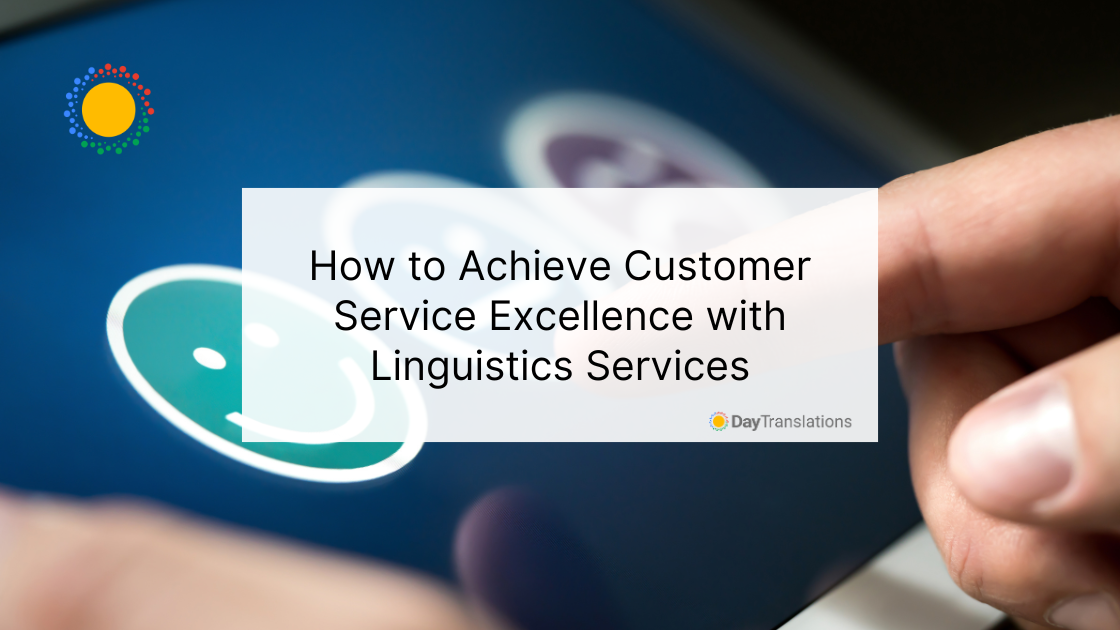Today, many businesses are realizing that customer service excellence is the key to success. The good news is that this goal can be made easier with the help of linguistic services. By leveraging these services, businesses can provide a better omnichannel customer experience, utilize AI and automation for enhanced customer service, and measure the ROI of linguistic services to ensure customer service excellence. This blog post will discuss how businesses can use linguistic services to achieve customer service excellence. We’ll cover the basics of linguistic services, how to apply AI and automation for improved customer service, and best practices for choosing the right linguistic services and measuring their ROI.
Understanding the Basics of Linguistic Services for Customer Service Excellence
Here we’ll explore the importance of linguistic services for customer service excellence, provide examples of successful customer service using these services, and discuss best practices for optimizing your business’s customer service with them.
The Importance of Linguistic Services for Customer Service Excellence
Linguistic services are important in providing excellent customer service due to their ability to quickly understand customers’ needs and provide personalized solutions. By leveraging linguistic services, businesses can provide faster response times and more accurate resolutions while also improving their overall customer satisfaction levels. Additionally, these services enable businesses to better understand language nuances that would otherwise be difficult to decipher without expert help. This understanding helps them create tailored responses that are relevant to each situation.
Examples of Successful Customer Service Using Linguistic Services
One example of successful digital customer service using linguistic services is Microsoft’s translation bot “Zo” which was designed to help customers communicate in different languages through text or voice chat. The bot is powered by advanced machine learning algorithms, which enable it to accurately interpret what customers are saying in real-time and provide appropriate responses in their native language. Another example is Amazon’s Alexa, which uses natural language processing (NLP) technology to recognize user commands in multiple languages such as English, French, Hindi, and Spanish among others.
Best Practices For Optimizing Customer Service With Linguistic Services
To get the most out of your linguistics services and achieve customer service excellence, there are some key steps you should follow:
- Identify your target audience – Knowing who you want to serve will help you determine which types of linguistic services best fit your needs
- Invest in high-quality translations – Quality translations not only ensure accuracy but also give customers confidence that they are getting the best possible service from your organization
- Utilize Machine Learning (ML) – ML can help automate processes like translation so that customers don’t have to wait too long for their requests or queries to be addressed
- Use Natural Language Processing (NLP) – NLP can help detect sentiment so that businesses can respond appropriately based on how a customer feels about an issue or query
- Test Your Results – Regularly testing your linguistics applications will ensure accuracy and consistency over time
Choosing the Right Linguistic Services for Your Business
When it comes to providing outstanding customer service, selecting the appropriate linguistic services is imperative. Knowing which services will best meet your customers’ needs and having a reliable provider can be the difference between a satisfied customer and an unsatisfied one.
Here are some tips for making sure you get the most out of your linguistic services:
Research Customer Feedback
Investigating customer opinion is critical when choosing language services since it can guide you in deciding which services are necessary and anticipated. Take note of any common complaints or issues that customers have with their current service and use this information to inform your decision-making process.
Look for Providers with Proven Track Records in Customer Service Excellence
It’s important to find a provider who has experience delivering excellent customer service in multiple languages, as this indicates that they understand how to handle different types of customers and inquiries. Look for companies that have received positive reviews from their clients and have a good track record of providing quality results on time.
Ensure Reliability
It is imperative to have a dependable language services business in order to accomplish the highest level of customer satisfaction. Make sure the provider you choose has a high level of responsiveness and can handle any customer queries quickly and efficiently. Additionally, look for providers who offer up-to-date tools such as machine learning or natural language processing technology, which can help automate processes like translation or text analysis, saving time, and improving accuracy.
Test Results
Testing your chosen linguistics services before launching them is highly recommended as it gives you an opportunity to identify any potential errors or areas of improvement before they affect customers’ experiences negatively. Make sure you test all aspects, including accuracy, consistency, speed, scalability, etc., so that you can be sure that your chosen linguistics services are up to scratch before putting them into action.
Building an Omnichannel Customer Experience with Linguistic Services
Creating an omnichannel customer experience with linguistic services is a crucial part of achieving customer service excellence. Businesses can improve customer service with linguistic services by using all available channels and languages. To do this effectively, businesses need to understand the customer journey in each channel and the customer’s context.
One of the most important steps for businesses is to create a consistent brand narrative across all channels and languages, while still allowing for localization when necessary. This involves ensuring that any content used across multiple channels remains consistent with language and tone while considering any cultural differences or local laws.
By leveraging these tools, companies can also personalize customer interactions in multiple languages, providing real-time support for localized customers. Additionally, integrating linguistics services with existing customer service tools can help streamline the customer service process by ensuring that all communication remains accurate and on-brand no matter what channel it’s being sent through.
Measuring the ROI of Linguistics Services for Customer Service Excellence
Measuring the return on investment (ROI) of linguistic services for customer service excellence is essential for businesses to understand if their investments are paying off. By understanding the cost-effectiveness of specific linguistic services, businesses can ensure they are getting the most out of their customer service operations. Here are some key metrics and performance indicators for measuring ROI:
Cost Per Call
Calculate the cost per call to determine how much you are spending on each customer interaction. This metric considers both direct and indirect costs associated with providing customer service. It includes employee wages, training, technology costs, and more.
Time On Hold
Time on hold measures how long customers wait before connecting with an agent or receiving a response back from an automated system. It can have a significant impact on customer satisfaction and should be monitored closely to ensure that customers aren’t waiting too long for help.
Average Response Time
Average response time measures how quickly agents respond to customer inquiries or requests. This metric is important because it indicates how efficient your customer service team is in responding to customers’ needs and resolving their issues quickly.
First Contact Resolution Rate
First contact resolution rates show how often agents resolve a problem during the first contact with customers without any follow-up calls or emails required afterwards.
TIP: A high FCRR indicates that your team can quickly identify customer issues and provide solutions in one go, resulting in improved customer experience and satisfaction levels.
Customer Satisfaction Score (CSAT)
CSAT score measures overall customer satisfaction with your product or service by asking customers about their experiences with your company across various aspects like product quality, ease of use, helpfulness of staff, and more. It provides valuable feedback from your users that helps you understand what areas need improvement to boost satisfaction levels further, but you’ll also see an average NPS score (Net Promoter Score) which can help understand how to enhance customer loyalty.
To track progress over time, develop a Customer Service Success Scorecard that compares different service models against each other over time so you can see which ones achieve better results while keeping costs down. By monitoring these metrics closely and adapting accordingly based on data collected through customer satisfaction surveys or focus groups, businesses can maximize the ROI of linguistics services while achieving true customer service excellence.
To Conclude
Linguistic services are essential in providing superior customer service. Utilizing these services enables businesses to deliver a more personalized and efficient customer experience, thus increasing customer satisfaction. Leveraging linguistic services effectively allows businesses to understand and address customers’ needs in their native language, resulting in a faster resolution, as well as a stronger connection with the customer.














Sorry, the comment form is closed at this time.